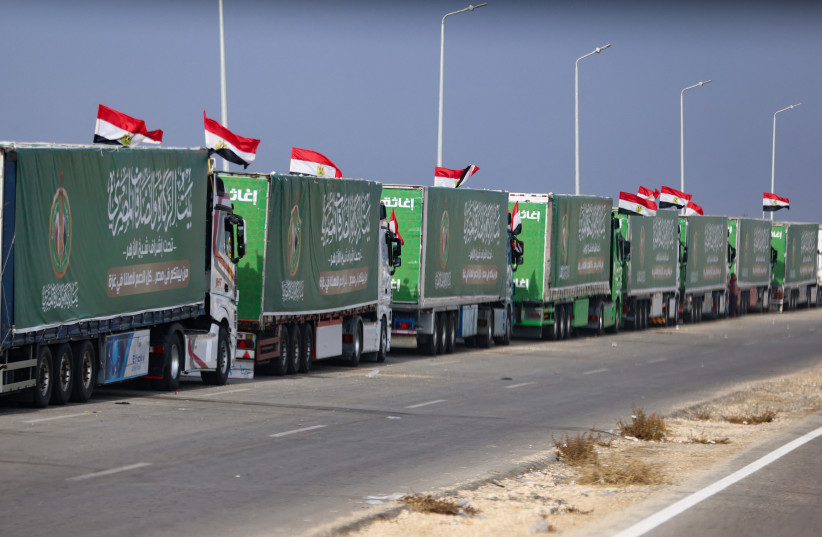World Food Program (WFP) Executive Director Cindy McCain amplified urgent appeals by aid agencies at an early morning visit to the Rafah border crossing as the Egyptian Red Crescent Society (ERCS) announced Egypt’s emergency supplies of food and medicine had dwindled to critical levels, having shipped the bulk of its stocks into Gaza.
For more stories from The Media Line go to themedialine.org
“Right now, parents in Gaza do not know whether they can feed their children today and whether they will even survive to see tomorrow. The suffering just meters away is unfathomable standing on this side of the border,” said McCain. “I’m making an urgent plea for the millions of people whose lives are being torn apart by this crisis.”
McCain met Egyptian President Abdel Fattah El-Sisi, who acknowledged Egypt’s domestic challenges in feeding its people, in addition to the added task of providing emergency food supplies to the beleaguered Gazans.
A presidential statement sent to The Media Line said El-Sisi’s meeting with McCain centered first on the importance of food security for Egyptians—with the president thanking the WFP for support pledged in a June agreement for a five-year assistance plan for school nutrition programs and the local equivalent of US food stamps for families in Egypt’s urban neighborhoods and rural villages where the poverty level exceeds the national rate of about 30%.

“President El-Sisi underscored Egypt’s deep concern over deteriorating humanitarian conditions in the Gaza Strip and reviewed the massive efforts exerted by Egypt around the clock to ensure the delivery of the greatest amount of aid possible to meet the real needs of Gaza’s people,” said presidential spokesman Ahmed Fahmy. “Meanwhile, we are continuing endeavors with regional and international actors to push toward reaching an immediate cease-fire.”
“We must complete the airlift of humanitarian aid to Gaza, as our stock from other countries, UN organizations, and humanitarian actors are running out,” said Dr. Ramy El-Nazer, ERCS executive director
As of Sunday, the Red Crescent has helped coordinate the transport of humanitarian cargo and unloaded over 70 airplanes from 17 nations landing at Cairo International and El Arish airports.
El-Nazer told The Media Line that his organization has brought over 450 trucks with about 6,000 tons of humanitarian aid into the war-ravaged Palestinian territory in a 15-day effort.
“The list of needs that come to the ERCS from the Palestinian Red Crescent is updated daily and changes based on the events that happen there,” said El-Nazer. “The houses are destroyed, the weather is getting cold, and we need blankets.”
The National Alliance for Civil Development—Egypt’s central state-directed civil society organization—has joined the local Red Crescent in mobilizing aid from the large Nile Valley population centers for distribution to Gazans through the Rafah crossing.
“Our volunteers are now preparing the equipment to send more aid to Gaza and save lives while also carrying out an extensive blood donation campaign in all regions, and we’re seeing trade union members and university students stand in line to give blood,” Mohamed Mamdouh, chairman of the Board of Trustees of the Egyptian Youth Council and National Alliance for Civil Action leader, told The Media Line.
“We’ve stationed the young people of our coalition at the Rafah crossing for the past 20 days, and our truck drivers who transport the aid [still] face significant challenges,” Mamdouh said in a telephone interview from the border zone.
“The journey does not end once the trucks enter the crossing, as they must cover a distance of over 50 kilometers to reach the Al-Awja crossing. Then, the cargo is inspected at another port that belongs to the occupying authority,” he said, referring to Israel. “At times, the cargo is denied entry due to improper packaging or the inclusion of certain items not present at inspection.”
“We hope the international community will increase pressure to bring in aid and trucks to save lives in Gaza,” Mamdouh added.
A small but steady number of injured Gazans have crossed the Rafah border post for treatment on the Egyptian side, where more than 100 ambulances are parked, ready to rush patients to facilities in the North Sinai and specialized medical centers in Port Said, Ismailia, Alexandria, and Cairo.
“So far, our doctors have performed approximately 50 complex surgical operations on children injured in Israeli airstrikes,” said Egyptian Health and Population Minister Khaled Abdel Ghaffar at a press conference outside the El-Arish General Hospital.
“We admit dozens of severe cases every day, and the average age of the patients is [about] 15 to 16 years old,” Abdel Ghaffar added.
“We are prepared to handle all medical cases arriving through the Rafah border crossing, but the Israeli side controls the number of those entering,” Abdel Ghaffar said.
